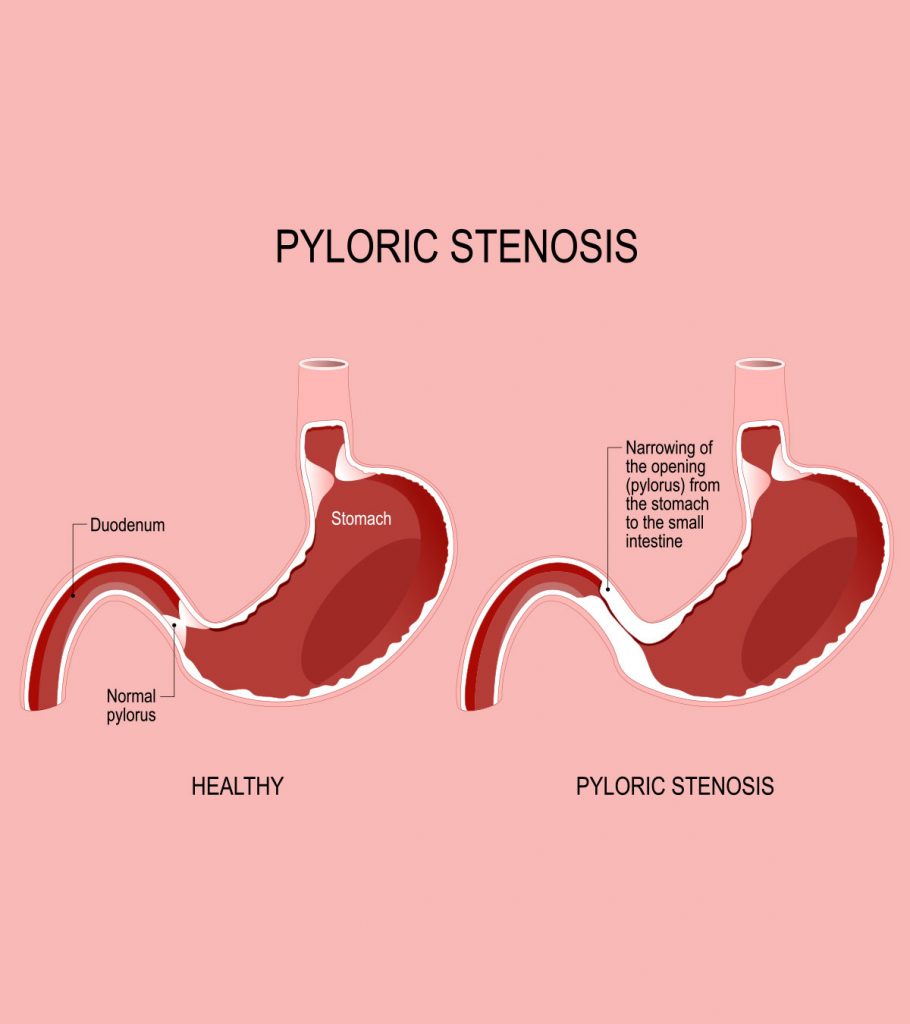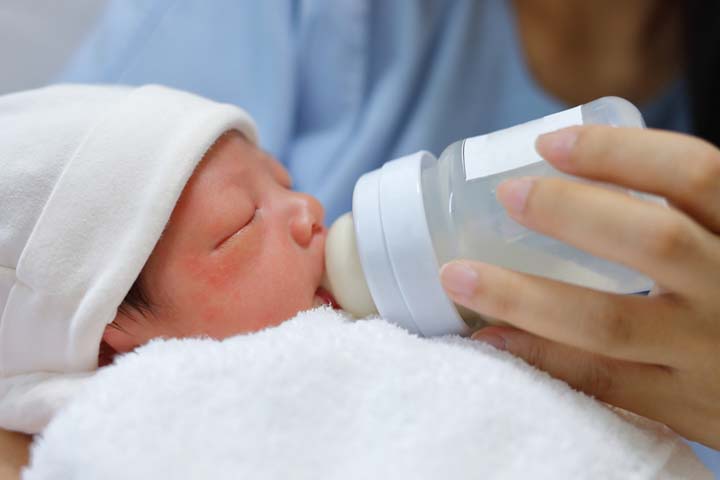The narrowing of the pylorus (opening from the stomach into the duodenum) is called pyloric stenosis. Pyloric stenosis in babies occurs due to the thickening of the pylorus muscles, preventing the food from passing through the stomach to the intestines. According to StatPearls Publishing by the National Library of Medicine, two to five in 1000 live births per year are diagnosed with pyloric stenosis. AD
This pediatric condition may cause vomiting after being fed, increasing the risk of fluid deficiency, nutrient deficiency, and weight loss. Babies with pyloric stenosis may seem hungry all the time, and vomiting may increase their food demand.
Keep reading this post to know about the symptoms, causes, risk factors, diagnosis, treatment, and complications of pyloric stenosis in babies.
Signs And Symptoms Of Pyloric Stenosis
You may notice pyloric stenosis signs and symptoms in your baby within three to five weeks after birth. The onset of pyloric stenosis is rare in infants older than three months.
The signs and symptoms of pyloric stenosis in babies include the following(1).
- Vomiting: Forceful vomiting that may go several feet across a room is seen after feeding. Some babies may have mild vomiting initially which gradually worsens to projectile vomiting. The vomitus consists of breastmilk or formula and rarely contains blood. You might experince feeding dififculties.
- Abdominal contractions: A wave-like movement on the upper abdomen may occur due to stomach contractions (peristalsis). This is usually seen after feeding but before vomiting. This is due to stomach muscles trying to move food through the narrow pylorus to the intestine.
- Hunger: Babies with pyloric stenosis may demand feeding soon after vomiting.
- Bowel habit changes: Babies may have constipation or fewer bowel movements since less food reaches the intestines.
- Dehydration: Vomiting may result in dehydration. Dry diapers, fewer wet diapers, crying without tears, and lethargy are the notable signs of dehydration. You must seek immediate medical care in such cases.
- Poor weight gain: Babies with pyloric stenosis may have weight loss or poor weight gain due to inadequate absorption of nutrients and affect an infant’s health.
Seek medical care if your baby has signs and symptoms of pyloric stenosis. Delaying the care may increase the risk of dehydration and lead to nutritional deficiencies.
Causes And Risk Factors For Pyloric Stenosis
Pyloric stenosis, also referred to as gastric outlet obstruction, occurs due to the thickening of the pylorus, but the exact cause behind it is unknown (2). Genetic and environmental factors may be involved in the development of this anomaly. Environmental factors could play a significant role since pyloric stenosis may often not be present at birth and usually develops later.
The following factors may increase the risk for pyloric stenosis in some babies (2).
- Male gender
- Positive family history
- Premature birth
- Bottle-feeding
- Antibiotics use, such as erythromycin, in early life
- Maternal smoking and certain antibiotics use during pregnancy
It is not entirely known how these factors increase the risk of pyloric stenosis. Some babies with risk factors may not develop this condition.
Diagnosis Of Pyloric Stenosis
Pediatricians may be able to palpate enlarged pylorus muscle as an olive-shaped palpable mass or lump on the abdomen. Doctors may also ask you to feed your baby and look for abdominal contractions and projectile vomiting.
The following tests are ordered if the symptoms and signs during physical examinations are suggestive of pyloric stenosis (3).
- Ultrasound could help visualize and examine the narrow pylorus.
- Abdominal X-ray (barium swallow or upper GI series) are taken to confirm the diagnosis further or if the ultrasound is not clear.
- Blood and other diagnostic tests are also conducted to evaluate dehydration and electrolyte balance that could indicate poor absorption of nutrients.
Pediatricians may refer your baby to a pediatric gastroenterologist or a surgeon to further diagnose and treat pyloric stenosis.
Treatment For Pyloric Stenosis
A surgical procedure called pyloromyotomy is required to treat pyloric stenosis. Thickened pylorus muscle is incised until the inner mucosal layer bulges out, letting the stomach contents pass to the intestines without issues. Pyloromyotomy can be done through traditional open surgery or laparoscopic surgery (4).
Intravenous fluid and electrolytes are given before surgery for dehydrated babies. Your baby may also need IV fluids for a few hours after surgery. Feeding sessions usually begin after 12 to 24 hours of surgery, and you may have to feed your baby more often to meet the nutritional needs. Some babies may have vomiting for a few days after surgery.
The improvement in medicine has led most surgeons to consider laparoscopic surgery as the standard procedure for treatment. David Fetterman, a father of two, shares how his son’s pyloric stenosis treatment came across as a less complex procedure than his own. “Nowadays, it is laparoscopic. They go in there without disturbing everything and make the cut. Today, the operation takes about an hour including prep and recovery. The little ones can eat the same day and go home the next. Little David (my son) was a textbook case. He ate already and tomorrow – home he goes.”
David Senior had the condition as an infant as well and reminisces how it was treated back then through open surgery. He says, “In my day, they pulled everything out a bit to work on it which created more stress on all the neighboring organs (i).”
If your little one has other complications, other procedures may be needed. Ask your child’s surgeon about the exact procedures to be done and the roadmap for the baby’s recovery.
Complications Of Pyloric Stenosis
The possible complications of pyloric stenosis may include the following (5).
- Dehydration and hypovolemic shock may occur due to fluid and electrolyte loss from persistent vomiting.
- Jaundice is seen in some babies due to reduced liver enzyme levels that itself may occur due to inadequate nutrition.
- Growth and development failure may be seen in some babies with nutritional deficiencies.
- Stomach irritation and bleeding due to repeated vomiting may occur in some cases.
Babies usually get well and grow after surgical intervention (6). Bleeding and infection may happen after surgery in some babies. You may discuss with your doctor the possible post surgery complications and requisite follow-up care.
Pyloric stenosis in babies may be a life-threatening condition since it leads to nutritional and fluid deficiencies. It is believed to be caused by environmental and genetic factors. Some typical pyloric stenosis symptoms in babies may include forceful vomiting, excessive hunger, and dehydration. If your baby shows these symptoms, consult a doctor without delay. An abdominal X-ray and blood tests will allow doctors to diagnose the condition. Pyloric stenosis can be successfully treated by a surgical procedure. Babies can usually lead a normal life after the treatment.
Key Pointers
- Pyloric stenosis is a condition in babies, where the muscle between the stomach and small intestine (pylorus) thickens, preventing the passage of food.
- This condition leads to persistent vomitings, hunger, dehydration, and bowel changes in babies.
- It could further lead to complications such as jaundice, bleeding, irritation in the stomach, and developmental delays.
- Pyloric stenosis can be fixed by surgery.
Explore the delicate topic of pyloric stenosis in infants – a condition affecting their digestive system. Uncover the causes, symptoms, and insights into this common but often misunderstood concern through this video.














